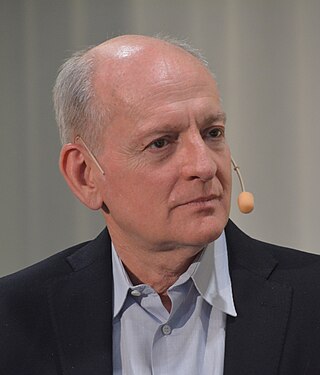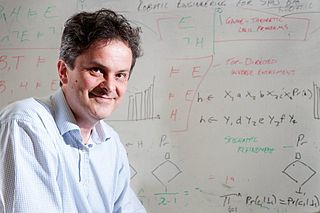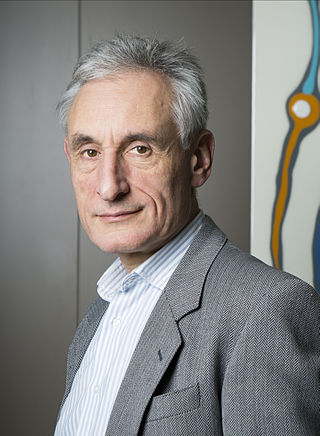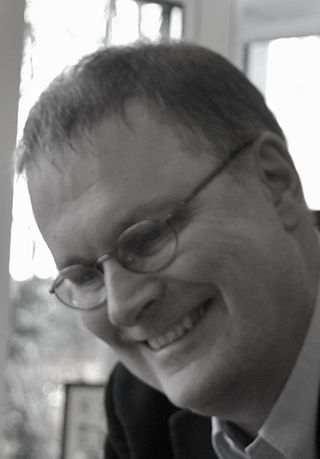
Arthur John Robin Gorell Milner was a British computer scientist, and a Turing Award winner.

Stuart Jonathan Russell is a British computer scientist known for his contributions to artificial intelligence (AI). He is a professor of computer science at the University of California, Berkeley and was from 2008 to 2011 an adjunct professor of neurological surgery at the University of California, San Francisco. He holds the Smith-Zadeh Chair in Engineering at University of California, Berkeley. He founded and leads the Center for Human-Compatible Artificial Intelligence (CHAI) at UC Berkeley. Russell is the co-author with Peter Norvig of the authoritative textbook of the field of AI: Artificial Intelligence: A Modern Approach used in more than 1,500 universities in 135 countries.

Jack Joseph Dongarra is an American computer scientist and mathematician. He is a University Distinguished Professor Emeritus of Computer Science in the Electrical Engineering and Computer Science Department at the University of Tennessee. He holds the position of a Distinguished Research Staff member in the Computer Science and Mathematics Division at Oak Ridge National Laboratory, Turing Fellowship in the School of Mathematics at the University of Manchester, and is an adjunct professor and teacher in the Computer Science Department at Rice University. He served as a faculty fellow at the Texas A&M University Institute for Advanced Study (2014–2018). Dongarra is the founding director of the Innovative Computing Laboratory at the University of Tennessee. He was the recipient of the Turing Award in 2021.

The School of Informatics is an academic unit of the University of Edinburgh, in Scotland, responsible for research, teaching, outreach and commercialisation in informatics. It was created in 1998 from the former department of artificial intelligence, the Centre for Cognitive Science and the department of computer science, along with the Artificial Intelligence Applications Institute (AIAI) and the Human Communication Research Centre.

J Strother Moore is an American computer scientist. He is a co-developer of the Boyer–Moore string-search algorithm, Boyer–Moore majority vote algorithm, and the Boyer–Moore automated theorem prover, Nqthm. He made pioneering contributions to structure sharing including the piece table data structure and early logic programming. An example of the workings of the Boyer–Moore string search algorithm is given in Moore's website. Moore received his Bachelor of Science (BS) in mathematics at Massachusetts Institute of Technology in 1970 and his Doctor of Philosophy (Ph.D.) in computational logic at the University of Edinburgh in Scotland in 1973.

Robert Anthony Kowalski is an American-British logician and computer scientist, whose research is concerned with developing both human-oriented models of computing and computational models of human thinking. He has spent most of his career in the United Kingdom.

Lawrence Charles Paulson is an American computer scientist. He is a Professor of Computational Logic at the University of Cambridge Computer Laboratory and a Fellow of Clare College, Cambridge.

Stephen H. Muggleton FBCS, FIET, FAAAI, FECCAI, FSB, FREng is Professor of Machine Learning and Head of the Computational Bioinformatics Laboratory at Imperial College London.

Austin Tate is Emeritus Professor of Knowledge-based systems in the School of Informatics at the University of Edinburgh. From 1985 to 2019 he was Director of AIAI in the School of Informatics at the University of Edinburgh.
In computer science, more particularly in automated theorem proving, rippling refers to a group of meta-level heuristics, developed primarily in the Mathematical Reasoning Group in the School of Informatics at the University of Edinburgh, and most commonly used to guide inductive proofs in automated theorem proving systems. Rippling may be viewed as a restricted form of rewrite system, where special object level annotations are used to ensure fertilization upon the completion of rewriting, with a measure decreasing requirement ensuring termination for any set of rewrite rules and expression.
Computational logic is the use of logic to perform or reason about computation. It bears a similar relationship to computer science and engineering as mathematical logic bears to mathematics and as philosophical logic bears to philosophy. It is an alternative term for "logic in computer science".

Andrew Blake FREng, FRS, is a British scientist, former laboratory director of Microsoft Research Cambridge and Microsoft Distinguished Scientist, former director of the Alan Turing Institute, Chair of the Samsung AI Centre in Cambridge, honorary professor at the University of Cambridge, Fellow of Clare Hall, Cambridge, and a leading researcher in computer vision.
Rodney Martineau "Rod" Burstall is a British computer scientist and one of four founders of the Laboratory for Foundations of Computer Science at the University of Edinburgh.

Moshe Ya'akov Vardi is an Israeli mathematician and computer scientist. He is the Karen Ostrum George Distinguished Service Professor in Computational Engineering at Rice University, United States. and a faculty advisor for the Ken Kennedy Institute. His interests focus on applications of logic to computer science, including database theory, finite model theory, knowledge of multi-agent systems, computer-aided verification and reasoning, and teaching logic across the curriculum. He is an expert in model checking, constraint satisfaction and database theory, common knowledge (logic), and theoretical computer science.
Simon Colton is an English computer scientist, currently working as Professor of Computational Creativity in the Game AI Research Group at Queen Mary University of London and in the Sensilab at Monash University, Australia.
Donald W. Loveland is a professor emeritus of computer science at Duke University who specializes in artificial intelligence. He is well known for the Davis–Putnam–Logemann–Loveland algorithm.

Wenfei Fan is a Chinese-British computer scientist and professor of web data management at the University of Edinburgh. His research investigates database theory and database systems.

Michael John Wooldridge is a professor of computer science at the University of Oxford. His main research interests is in multi-agent systems, and in particular, in the computational theory aspects of rational action in systems composed of multiple self-interested agents. His work is characterised by the use of techniques from computational logic, game theory, and social choice theory.

Carla Pedro Gomes is a Portuguese-American computer scientist and professor at Cornell University. She is the founding Director of the Institute for Computational Sustainability and is noted for her pioneering work in developing computational methods to address challenges in sustainability. She has conducted research in a variety of areas of artificial intelligence and computer science, including constraint reasoning, mathematical optimization, and randomization techniques for exact search methods, algorithm selection, multi-agent systems, and game theory. Her work in computational sustainability includes ecological conservation, rural resource mapping, and pattern recognition for material science.
Deepak Kapur is a Distinguished Professor in the Department of Computer Science at the University of New Mexico.














